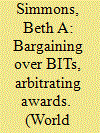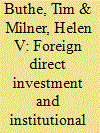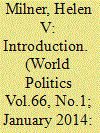|
|
|
Sort Order |
|
|
|
Items / Page
|
|
|
|
|
|
|
| Srl | Item |
| 1 |
ID:
128265


|
|
|
|
|
| Publication |
2014.
|
| Summary/Abstract |
The regime for international investment is extraordinary in public international law and controversial in many regions of the world. This article explores two aspects of this set of rules: its decentralization and the unusual powers it gives to private actors to invoke dispute settlement. Decentralization has contributed to a competitive environment for ratification of bilateral investment treaties (BITs) and has elevated the importance of dyadic bargaining power in the formation of the regime. Governments of developing countries are more likely to enter into BITs and tie their hands more tightly when they are in a weak bargaining position, which in turn is associated with economic downturns of the domestic economy. Once committed, investors have sued governments with surprising regularity, arguably contributing disproportionately to legal awards that favor the private corporate actors who have the power to convene the dispute settlement system. States have begun to push back, revising their obligations and attempting to annul arbitral awards. One of the conclusions is that it is important not only to consider whether BITs attract capital-which has been the focus of nearly all the empirical research on BIT effects-but also to investigate the governance consequences of the international investment regime generally.
|
|
|
|
|
|
|
|
|
|
|
|
|
|
|
|
| 2 |
ID:
128266


|
|
|
|
|
| Publication |
2014.
|
| Summary/Abstract |
Although many features of bilateral investment treaties (BITs) are consistent from one agreement to the next, a closer look reveals that the treaties exhibit considerable variation in terms of their enforcement provisions, which legal scholars have singled out as the central component of the treaties. An original data set is compiled that captures three important treaty-design differences: whether the parties consent in advance to international arbitration, whether they allow treaty obligations to be enforced before an institutionalized arbitration body, and how many arbitration options are specified for enforcement. Drawing upon several relevant literatures on international institutions, three potentially generalizable explanations for this important treaty variation are articulated and tested. The strongest support is found for the theoretical perspective that emphasizes the bargaining power and preferences of capital-exporting states, which use the treaties to codify strong, credible investor protections in all their treaties. Empirical tests consistently reveal that treaties contain strong enforcement provisions-in which the parties preconsent to multiple, often institutionalized arbitration options-when the capital-exporting treaty partner has considerable bargaining power and contains domestic actors that prefer such arrangements, such as large multinational corporations or right-wing governments. In contrast, there is no evidence to support the popular hands-tying explanation, which predicts that investment-seeking states with the most severe credibility problems, due to poor reputations or weak domestic institutions, will bind themselves to treaties with stronger investment protections. likewise, little support is found for explanations derived from the project on the rational design of international institutions, which discounts the identities and preferences of the treaty partners and instead emphasizes the structural conditions they jointly face. In sum, this foundational study of differences across investment treaties suggests that the design of treaties is driven by powerful states, which include elements in the treaties that serve their interests, regardless of the treaty partner or the current strategic setting.
|
|
|
|
|
|
|
|
|
|
|
|
|
|
|
|
| 3 |
ID:
128267


|
|
|
|
|
| Publication |
2014.
|
| Summary/Abstract |
International trade agreements lead to more foreign direct investment (FDI) in developing countries. This article examines the causal mechanisms underpinning this trade-investment linkage by asking whether institutional features of preferential trade agreements (PTAs), which allow governments to make more credible commitments to protect foreign investments, indeed result in greater FDI. The authors explore three institutional differences. First, they examine whether PTAs that have entered into force lead to greater FDI than PTAs that have merely been negotiated and signed, since only the former constitute a binding commitment under international law. Second, they ask whether trade agreements that have investment clauses lead to greater FDI. Third, they consider whether PTAs with dispute-settlement mechanisms lead to greater FDI. Analyses of FDI flows into 122 developing countries from 1971 to 2007 show that trade agreements that include stronger mechanisms for credible commitment induce more FDI. Institutional diversity in international agreements matters.
|
|
|
|
|
|
|
|
|
|
|
|
|
|
|
|
| 4 |
ID:
128264


|
|
|
|
|
| Publication |
2014.
|
| Summary/Abstract |
The world economy has maintained or enhanced its integration in the past decade even in the face of the global financial crisis. A large part of this globalization has been driven by capital flows. This symposium focuses on one element of these capital flows, foreign direct investment (FDI), and on the regime in place to safeguard and promote such investments around the globe. The articles by Allee and Peinhardt and Simmons focus on the nature and evolution of the bilateral investment treaties (BITs) that have been developed to protect such investments and that have proliferated since the 1990s. The final article, by Büthe and Milner, turns its attention to the ways in which international trade agreements affect FDI. The comparison between the investment and trade agreements is instructive, since they seem to have different effects.
FDI has become one of the most important economic flows in the global economy. It is a critical source of capital for developing countries and remains a significant source of investment in the developed world. FDI has grown in part because countries changed their policies toward it dramatically after the 1980s; governments in developing countries made unilateral policy changes that opened up markets across the globe and increased competition among countries for FDI.
|
|
|
|
|
|
|
|
|
|
|
|
|
|
|
|
|
|
|
|
|